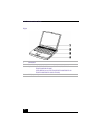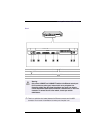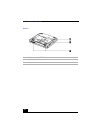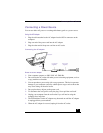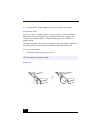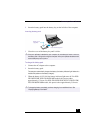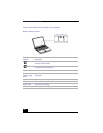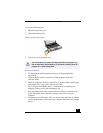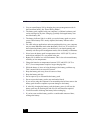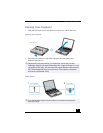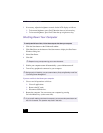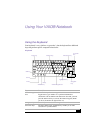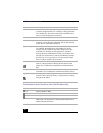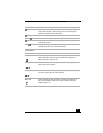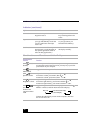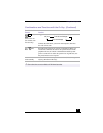
VAIO Notebook User Guide
30
❑ You can extend battery life by changing the power-management modes in
the PowerPanel utility. See “Power Saving Modes”
❑ The battery pack supplied with your computer is a lithium-ion battery and
can be recharged at any time. Charging a partially discharged battery does
not affect battery life.
❑ The battery indicator light is on while you use the battery pack as a power
source. When battery life is nearly depleted, the battery indicator starts
flashing.
❑ For some software applications and some peripheral devices, your computer
may not enter Hibernate mode when the battery life is low. To avoid loss of
data when using battery power, you should save your data frequently and
manually activate a power-management mode, such as Standby or Hibernate.
❑ Never leave the battery pack in temperatures above 140° F (60° C), such as
under direct sunlight or in a car parked in the sun.
❑ Battery life is shorter in a cold environment. This is due to decreased battery
efficiency at low temperatures.
❑ Charge the batteries at temperatures between 50° F and 80° F (10° C to
30
° C). Lower temperatures require a longer charging time.
❑ While the battery is in use or being discharged, the battery pack heats up.
This is normal and is not cause for concern.
❑ Keep the battery pack away from all sources of heat.
❑ Keep the battery pack dry.
❑ Do not open or try to disassemble the battery pack.
❑ Do not expose the battery pack to any mechanical shock.
❑ If you are not using the computer for an extended period of time, remove the
battery pack from the computer to prevent damage to the battery.
❑ If, after fully charging the battery pack, the battery power is still low, the
battery pack may be reaching the end of its life and should be replaced.
❑ You do not need to discharge the battery before recharging.
❑ If you have not used the battery pack for a considerable amount of time,
recharge the battery.



